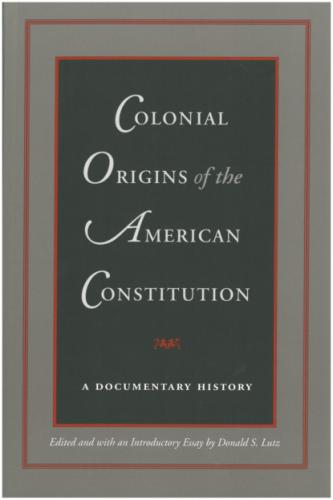Colonial Originsof theAmericanConstitution
This book is published by Liberty Fund, Inc., a foundation established to encourage study of the ideal of a society of free and responsible individuals.
The cuneiform inscription that serves as our logo and as a design element in Liberty Fund books is the earliest-known written appearance of the word “freedom” (amagi), or “liberty.” It is taken from a clay document written about 2300 B.C. in the Sumerian city-state of Lagash.
© 1998 by Liberty Fund, Inc.
This eBook edition published in 2012.
eBook ISBN: E-PUB 978-1-61487-131-6
Contents
NEW HAMPSHIRE
1 Agreement of the Settlers at Exeter in New Hampshire, July 5, 1639
The covenant that created Exeter’s first town government.
2 General Laws and Liberties of New Hampshire, March 16, 1680
An apparent legal code for the province of New Hampshire that also lays out the government’s institutions and powers.
MASSACHUSETTS
3 Agreement Between the Settlers at New Plymouth (The Mayflower Compact), November 11, 1620
The oldest and most famous colonial political covenant.
4 Plymouth Oath of Allegiance and Fidelity, 1625
The oldest surviving citizenship oath—designed to bring post-1620 arrivals into the Mayflower Compact agreement.
Another citizenship oath, but one that functioned for several years as the only basis for town government.
6 Agreement of the Massachusetts Bay Company at Cambridge, England, August 26, 1629
An equivalent to the Mayflower Compact but written by the colonists in England before they set sail.
7 The Watertown Covenant of July 30, 1630
Strictly speaking a church covenant, it is also a political covenant because the settlers were establishing a theocracy.
8 Massachusetts Election Agreement, May 18, 1631
The oldest colonial provision for a formal electoral process.
9 The Oath of a Freeman, or of a Man to Be Made Free, 1631
Until 1631 almost all freemen had been politically bound by the church covenant. This oath covered nonchurch members.
10 The Massachusetts Agreement on the Legislature, May 9, 1632
The first formal specification of Massachusetts political institutions and, although brief, still a protoconstitution.
11 Cambridge Agreement, December 24, 1632
Town meetings predated this document, but it is the oldest surviving agreement formally establishing the institution.
12 Dorchester Agreement, October 8, 1633
Establishes a town meeting and is the oldest document to create an elected council to run government between meetings.
13 Cambridge Agreement on a Town Council, February 3, 1634
An ordinance passed by the town meeting creating a town council.
14 Massachusetts Agreement on the Legislature, May 14, 1634
A revision of, and enlargement upon, The Massachusetts Agreement on the Legislature [10], which looked like a constitution and essentially functioned as one.
15 The Oath of a Freeman, May 14, 1634
Replacement for The Oath of a Freeman [9], which reflects an evolving sense of citizenship by not requiring church membership.
16 Salem Oath for Residents, April 1, 1634
An oath for noncitizen residents.
17 Watertown Agreement on Civil Officers, August 23, 1634
Ordinance establishing the town’s first civil offices.
18 The Enlarged Salem Covenant of 1636
